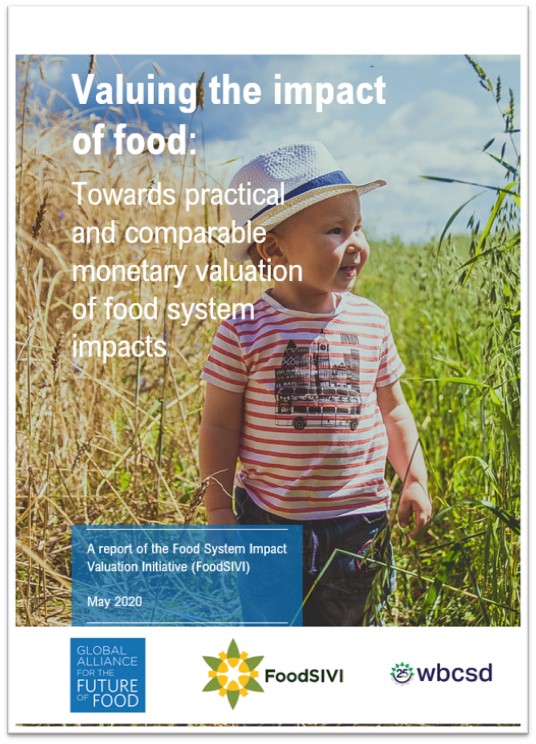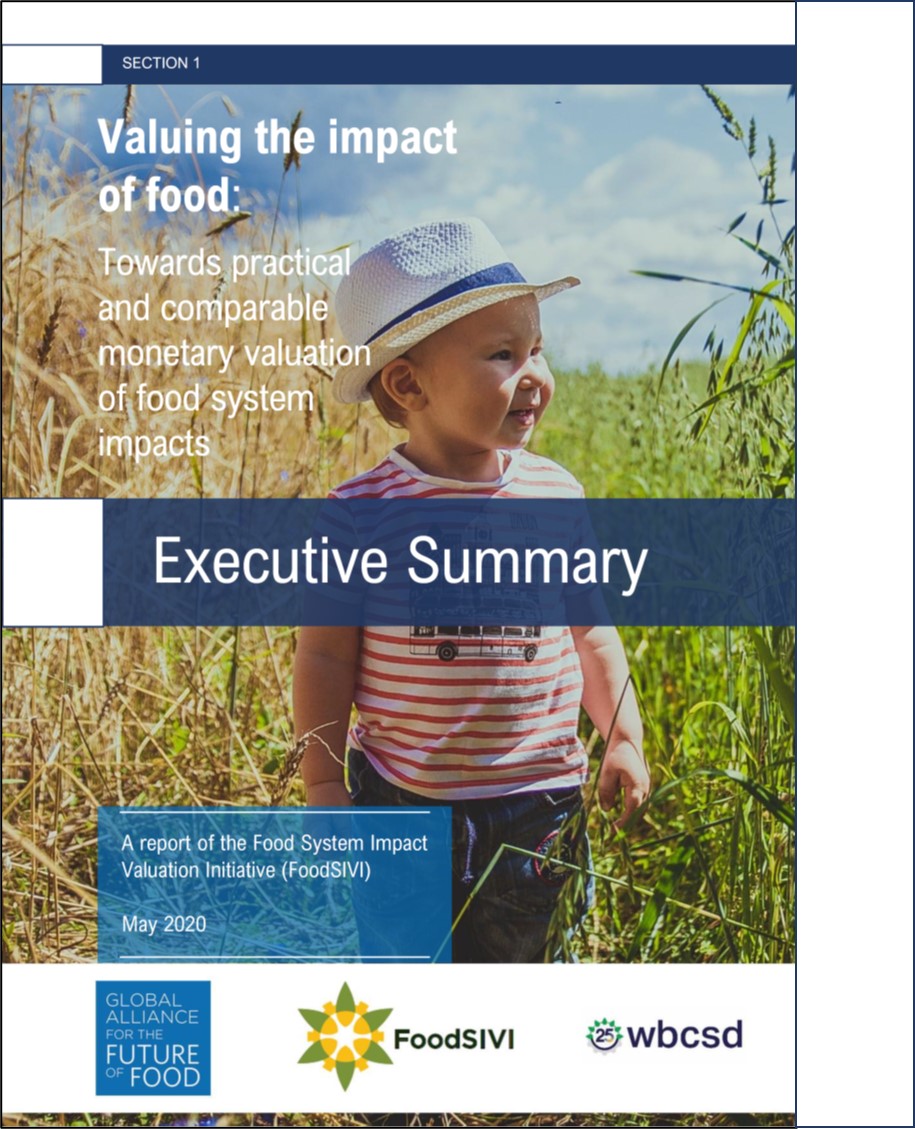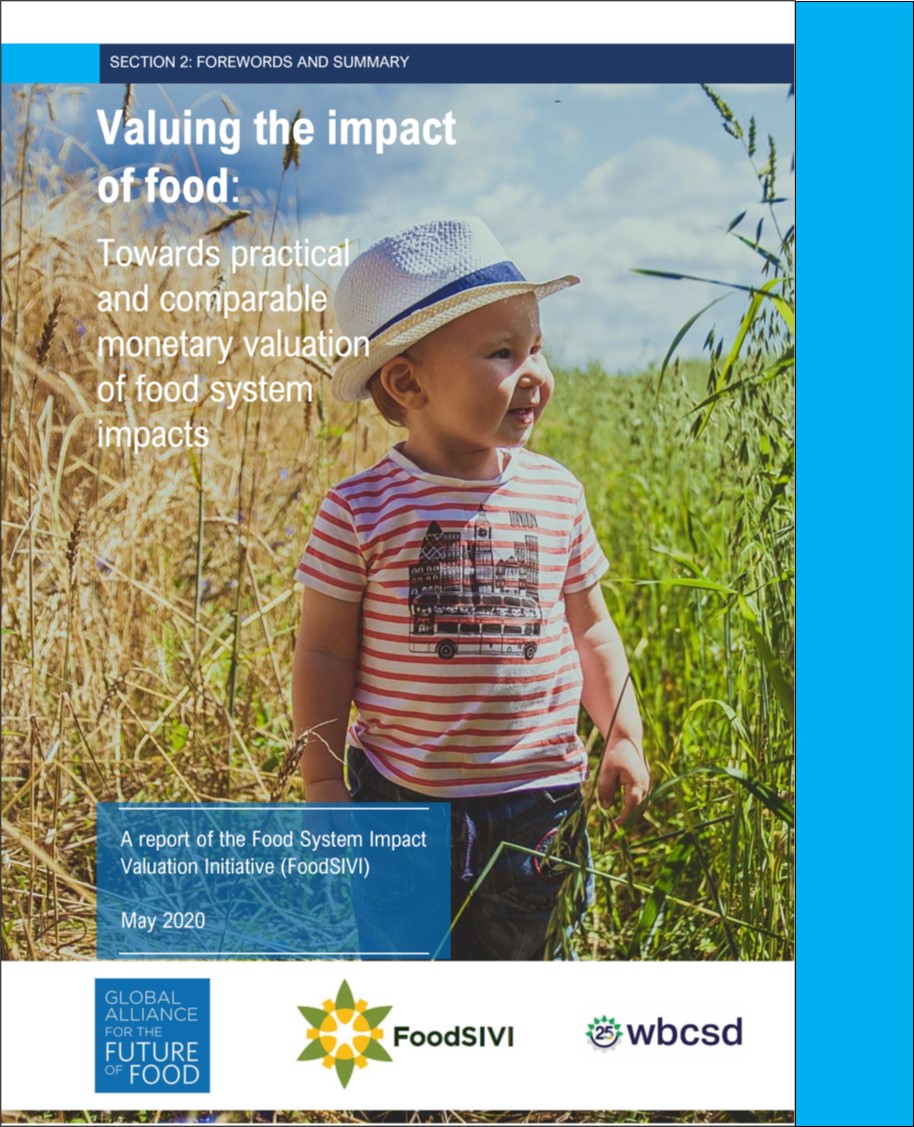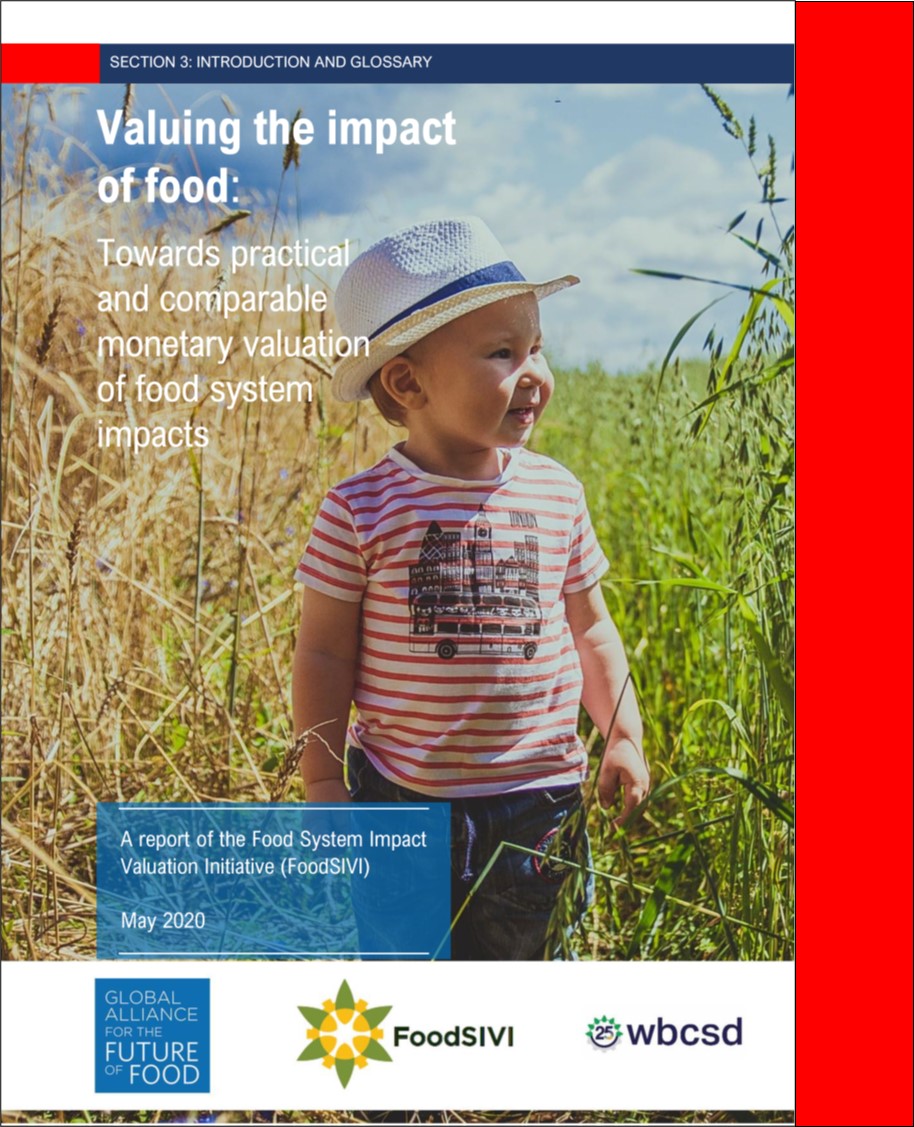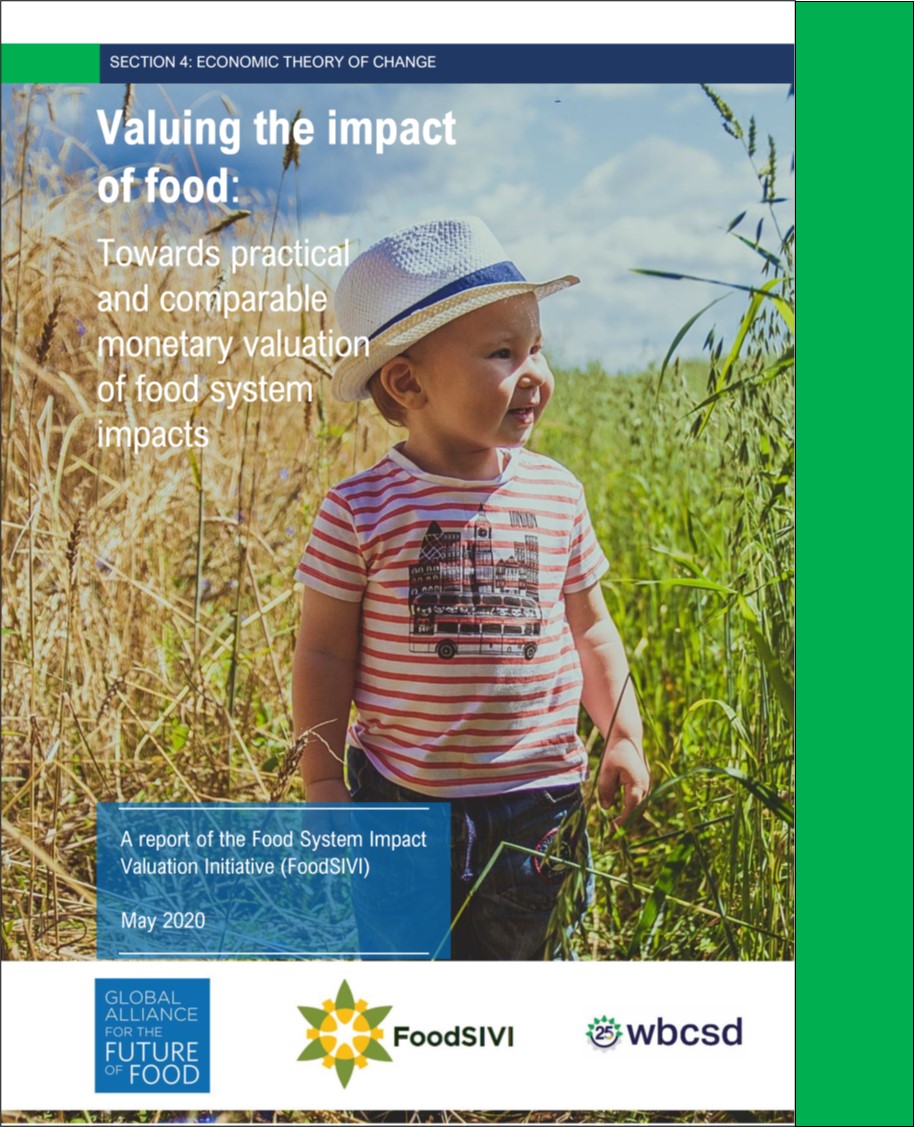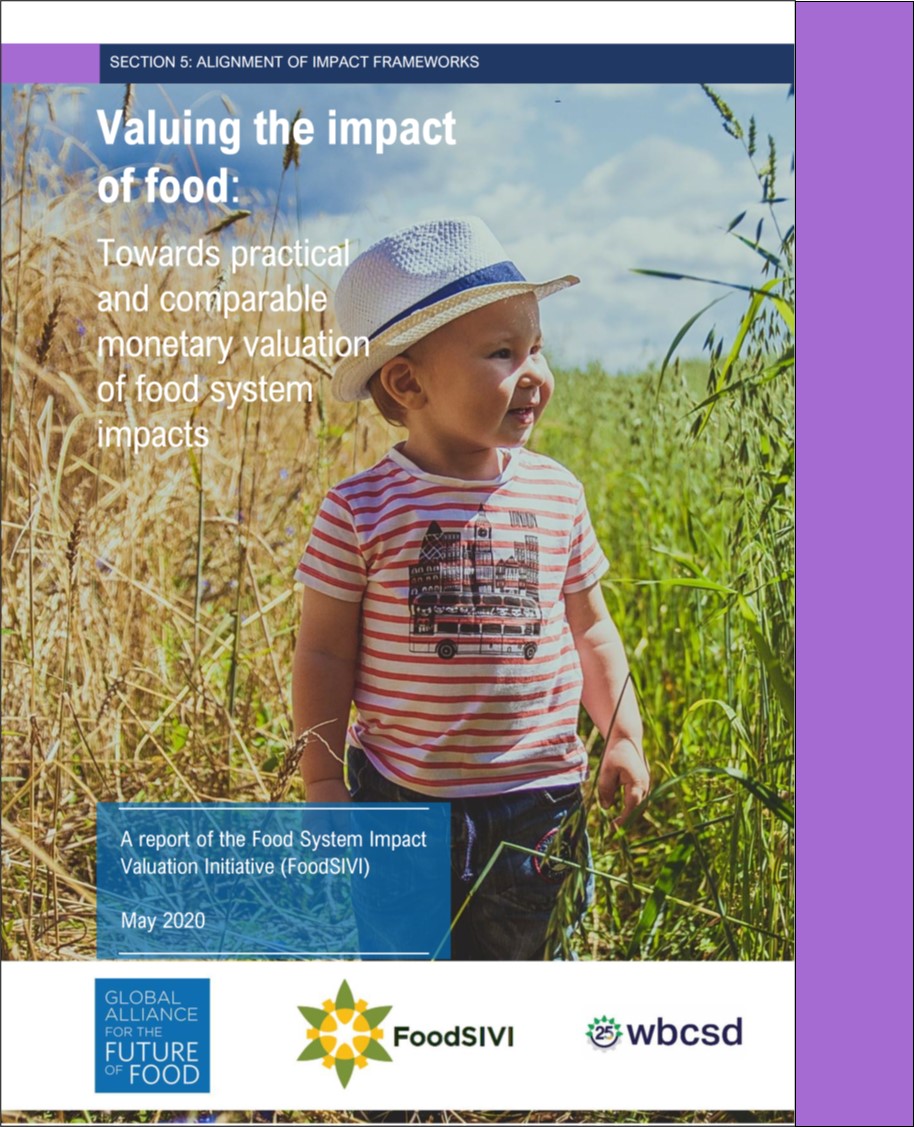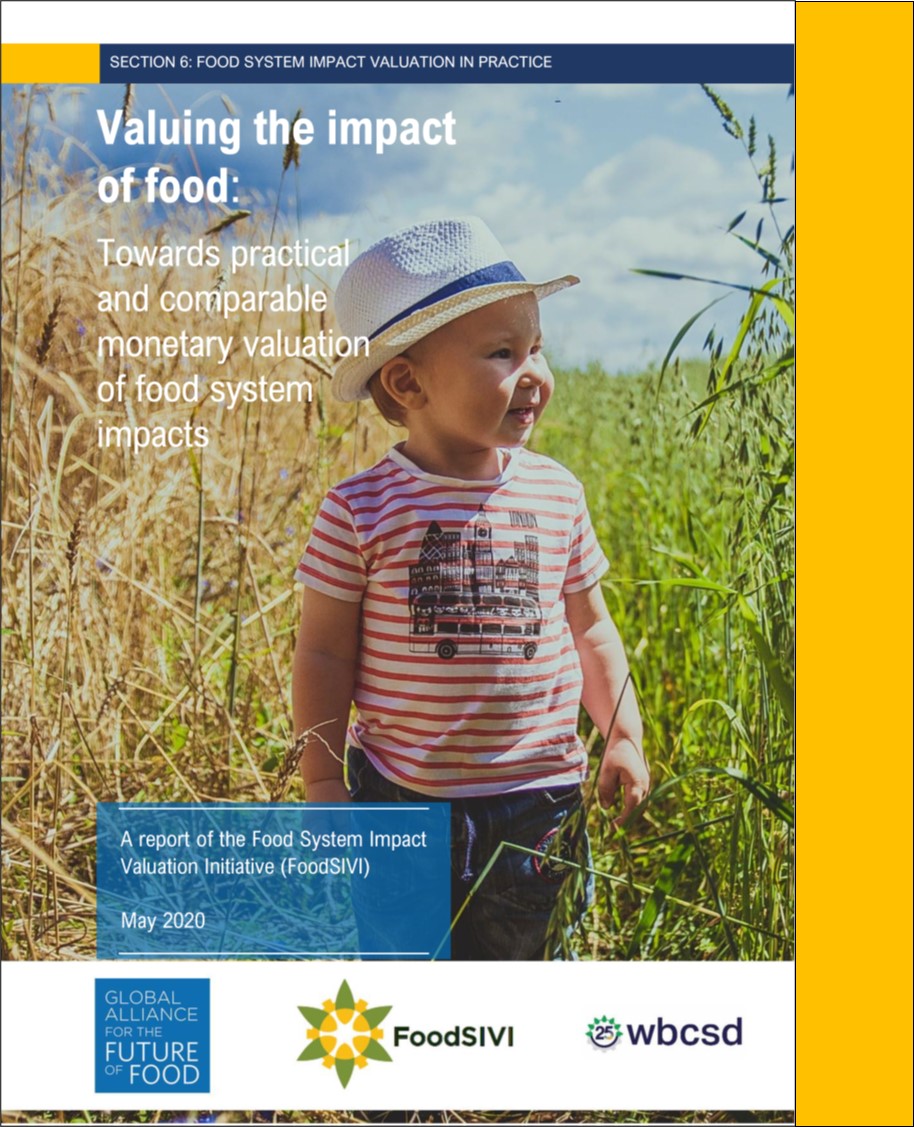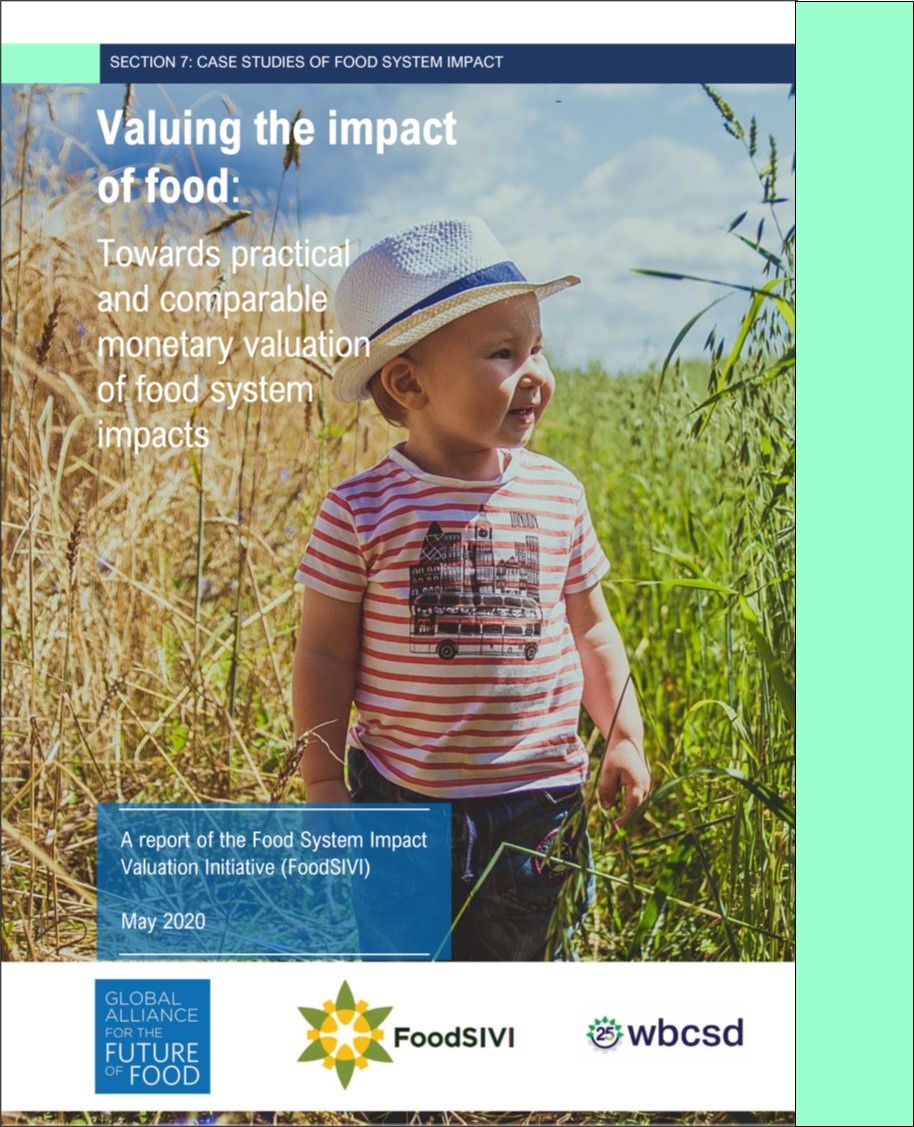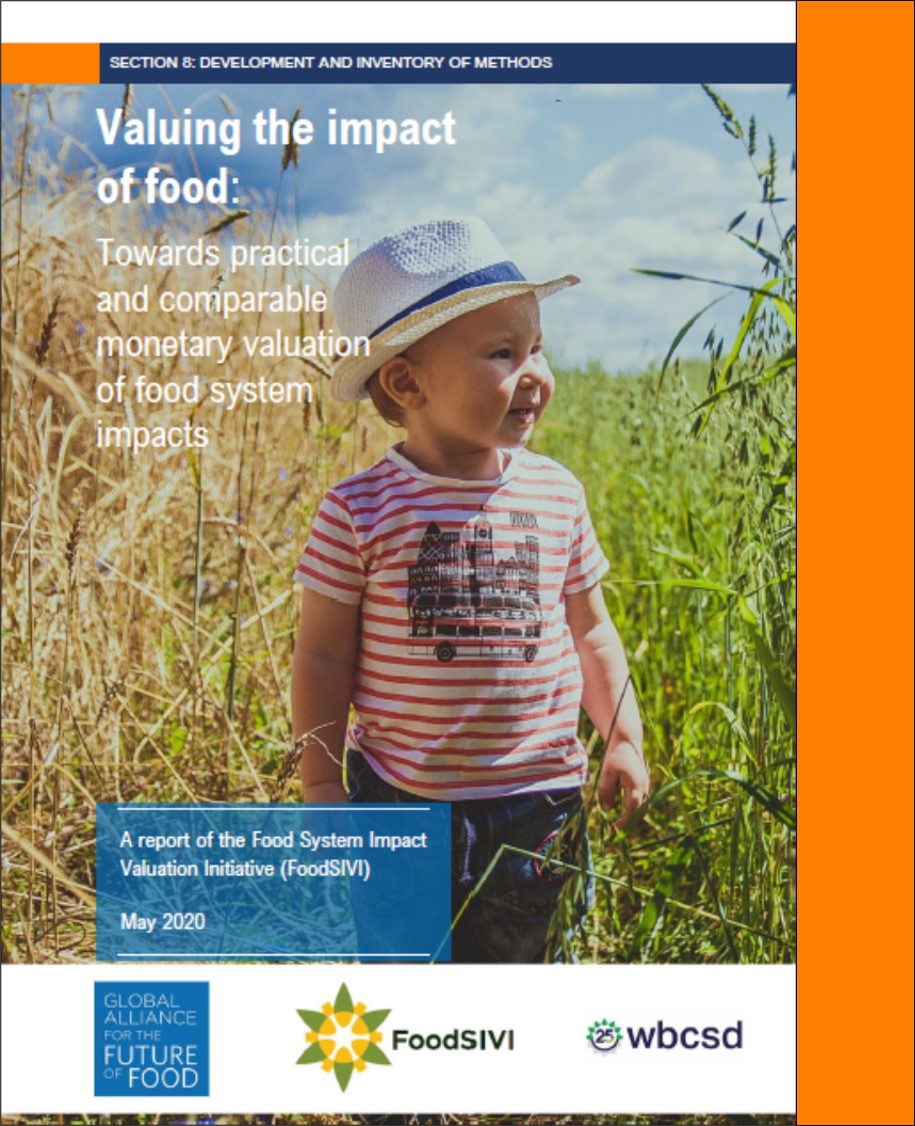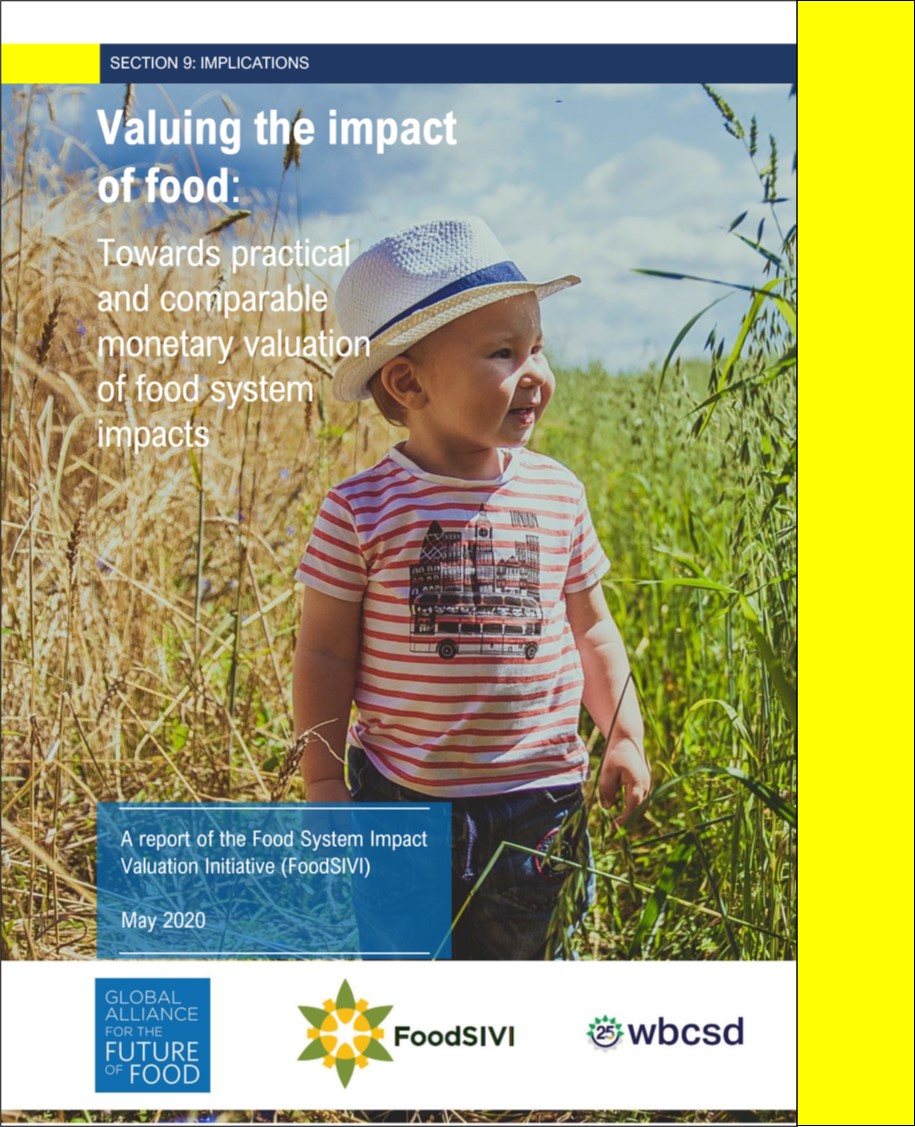The research we do in collaboration with our partners drives:
- valuation of non-carbon impacts from the production, processing and consumption of food (biodiversity loss, health care burden, poverty, etc.)
- opportunities for leading companies to demonstrate sustainability performance and contribute to reducing food system impacts
- economic food policy at scale
If you’re interested in becoming a research partner, get in touch with the FoodSIVI team
FoodSIVI reports
The first FoodSIVI report Valuing the Impact of Food: Towards practical and comparable monetary valuation of food system impacts is available to download in full or in sections
What is the cost of the food we eat? What is the value of the sustainable products and practices in the food sector? How do we balance the short-term and private value that food provides with the longer-term and externalised costs taking their toll on nature, the communities of workers producing and processing food, human health, and more?
This report from the Food System Impact Valuation Initiative (FoodSIVI) examines food impact costing, and whether the way that carbon is costed in terms of social and abatement costs of carbon footprints can be adjusted to estimate the longer-term and externalised costs of food production, processing and consumption. It argues that a footprint protocol solidifying what to measure and how to track footprint reduction should be developed. It finds unavoidable ethical choices and order of magnitude uncertainties inherent in both social and abatement costing, recommending that a consortium of intergovernmental and institutional actors and experts in collaboration with the food sector process should compile, set and update shadow prices associated to food footprints.
Read the release about the Valuing the Impact of Food Report
DOWNLOAD THE FULL REPORT (PDF, 7MB)
Executive Summary of the Valuing the Impact of Food report
The global food system is associated to massive externalised costs. Recovering those costs would result in a tremendous change in human and social welfare and a very different global future.
Abatement costing should be developed to achieve reduction targets and sponsor radical changes in agricultural subsidies and tariffs, incentives for land management, and market opportunities for sustainable and healthy products.
DOWNLOAD THE EXECUTIVE SUMMARY (PDF, 600KB)
Section 2: Forwards and Summary
A summary of the report including technical details. Forewords on the relevance of impact costing and true cost accounting of food systems from the Director of the Environmental Change Institute, the Executive Director of the Global Alliance of the Future of Food, and the Managing Director of WBCSD’s Food and Nature program..
DOWNLOAD SECTION 2: FOREWORDS AND SUMMARY (PDF, 1MB)
Section 3: Introduction and Glossary
Outlines the scale of the natural and human cost of food system externalities, and impact valuation’s contribution to change. Provides a glossary of terms connecting economics and impact frameworks.
DOWNLOAD SECTION 3: INTRODUCTION AND GLOSSARY (PDF, 1 MB)
Section 4: Economic Theory of Change
Food system impact as a textbook market failure, and why and how impact valuation can create change in the food system through changing economic incentives.
DOWNLOAD SECTION 4: ECONOMIC THEORY OF CHANGE
(PDF, 1.1MB)
Section 5: Alignment of Impact Frameworks
Alignment of ‘Measure and Value’ within the TEEB Agri-Food Framework and the Natural, and Social & Human, Capital Protocols. The discussion includes the scope and value perspectives required for comparable impact valuation.
DOWNLOAD SECTION 5: ALIGNMENT OF IMPACT FRAMEWORKS (PDF, 1.4MB)
Section 6: Food System Impact Valuation in Practice
Describes carbon costing as an introduction to marginal social and abatement costing of footprints. Examines the challenges for social and abatement costing of food system impacts, including practical and ethical challenges, and irresolvable uncertainty. Proposes a linear model with second order corrections for scarcity and correlations between food system impacts, and a risk model for uncertainty in costings.
DOWNLOAD SECTION 6: FOOD SYSTEM IMPACT VALUATION IN PRACTICE (PDF, 3.4MB)
Section 7: Case Studies of Food System Impact Valuation
Examples of food system impact valuations, illustrating variation in marginal social and abatement costs and footprints. Scale of the studies range from the global food system to the marginal abatement offered by changing products and practices. Discusses the importance of demand for determining total abatement.
DOWNLOAD SECTION 7: CASE STUDIES OF FOOD SYSTEM IMPACT (PDF, 1.4MB)
Section 8: Development and Inventory of Methods
A discussion of the development of impact valuation, arguing for the movement toward spatial and contextual footprints and standardised marginal valuations, plus an inventory of the data, models and methods mentioned in the report for food system footprint calculation and impact costing.
DOWNLOAD SECTION 8: INVENTORY AND DEVELOPMENT OF METHODS (PDF, 1MB)
Section 9: Implications
Implications of the practical, technical, and ethical challenges in food system impact valuation. Implications for corporate reporting, market signals, and best practice.
DOWNLOAD SECTION 9: IMPLICATIONS (PDF, 1MB)
Reports from FoodSIVI Partners
We work with other true cost accounting initiatives to champion food system transformation through internalisation of the food system’s environmental, social and health externalities. Our partners include NGOs, academic and institutional coalitions, consultant social enterprises and business coalitions.
World Business Council Sustainable Development (WBCSD)
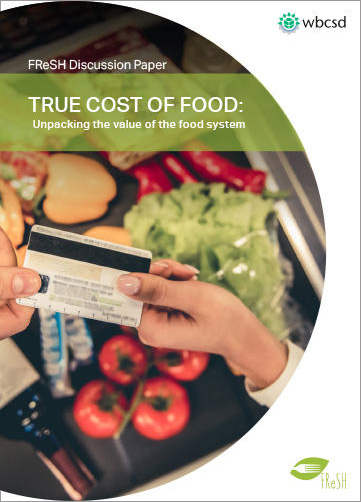
True Cost of Food: Unpacking the value of the food system
FReSH’s True Cost of Food discussion paper identifies methodological and data gaps to be filled to make true cost accounting (TCA) for food sector companies more robust, consistent and user-friendly. It also explores what is required to establish true cost approaches in the business environment, moving TCA from corporate sustainability teams to the desks of CEOs and CFOs of food companies. These organisational dimensions are especially critical in making TCA a core tool of strategic business decision-making.
Download the pdf of the report (4.7 MB)
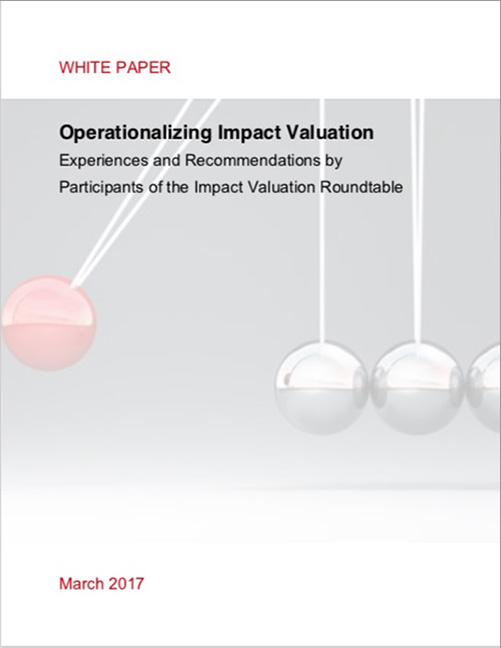
The Impact Valuation Roundtable White Paper
The Impact Valuation Roundtable White Paper was shared publicly at WBCSD’s member event in March 2017. In the paper, the group of roundtable companies highlights ongoing challenges and commits to tackle them collaboratively, stating: “We will continue our engagement with stakeholders – in a supportive and critical way – in the development of simplification, convergence, operationalization and alignment on impact valuation methods and valuation coefficients.”
Download a pdf of the White Paper (611 KB)
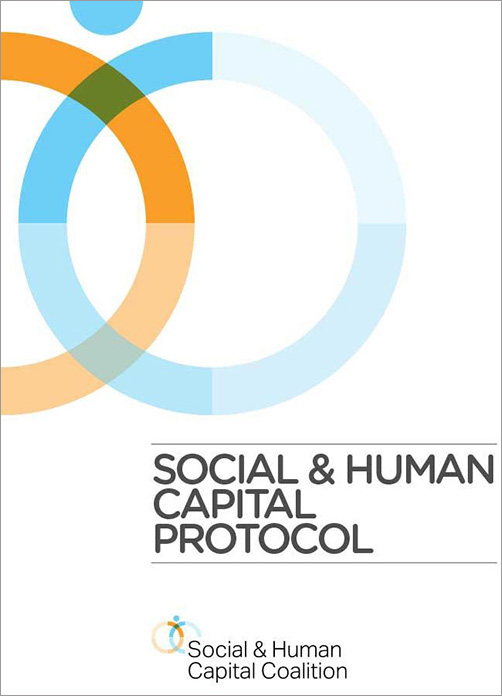
The 2019 Social & Human Capital Protocol
The Protocol is a framework for businesses to measure and value their impacts and dependencies on people and society. It was designed to support effective business decision-making and communicate the full value business generates for society. It includes twenty company case studies, feedback from public consultation and is streamlined for use alongside the Natural Capital Protocol.
Download a pdf of the report (4.7 MB)
The Global Alliance for the Future of Food
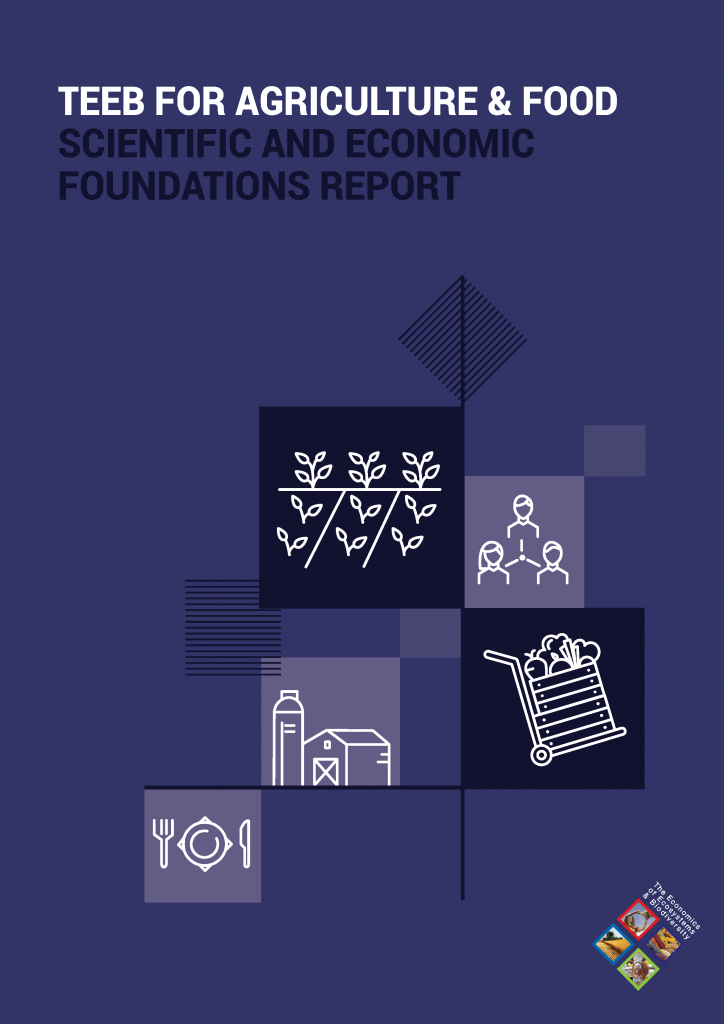
TEEBAgriFood Scientific and Economic Foundations report
The TEEBAgriFood ‘Scientific and Economic Foundations’ report was developed to address the core theoretical issues and controversies underpinning the evaluation of the nexus between the agri-food sector, biodiversity and ecosystem services and externalities including human health impacts from agriculture on a global scale. Developed by teams of scientists, researchers and economists it argues the need for a ‘systems thinking’ approach, draws out issues related to health, nutrition, equity and livelihoods, and presents a Framework for evaluation and describes how it can be applied. It identifies broad uses of the Framework in theories and pathways for transformational change. Download a pdf of the report (6.2 MB)
The Food and Land Use Coalition
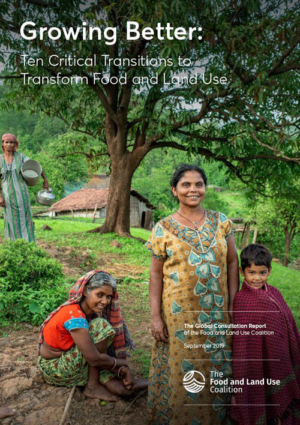
Growing Better: Ten Critical Transitions to Transform Food and Land Use
The academic and scientific community has articulated in the last five years a remarkable opportunity to transform food and land use systems, but as the challenges are growing, we need to act with great urgency. The global report from the Food and Land Use Coalition (FOLU) proposes a reform agenda – centred around ten critical transitions – of real actionable solutions. If actioned, the transitions could boost progress towards the Sustainable Development Goals (SDGs) and the Paris Agreement, help mitigate the negative effects of climate change, safeguard biodiversity, ensure more healthy diets for all, drastically improve food security and create more inclusive rural economies. The report performs a global food system impact valuation called the ‘hidden costs’ of the global food systems, and estimates the costs of not acting. Investment amounts and potential return for companies in the transformation are also costed.
Download a pdf of the report (28 MB)
The Food, Agriculture, Biodiversity, Land-Use, and Energy (FABLE) Consortium
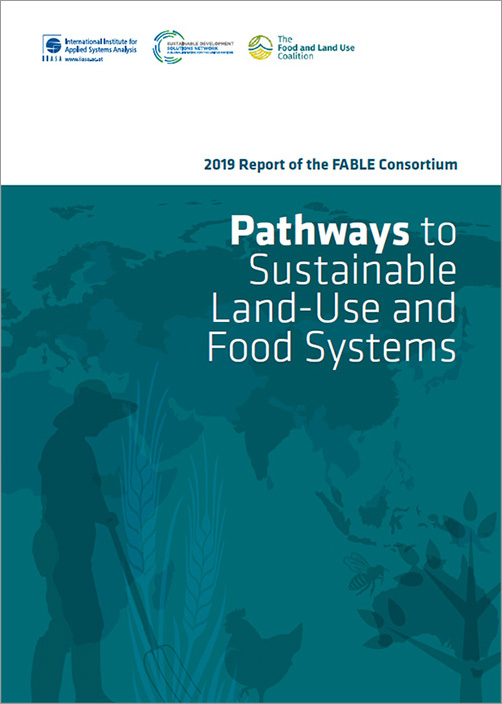
2019 Report of the FABLE Consortium: Pathways to Sustainable Land-Use and Food Systems
FABLE was convened as part of the Food and Land-Use Coalition (FOLU). It aims to understand how countries can transition towards sustainable land-use and food systems. In particular, we ask how countries can collectively meet associated Sustainable Development Goals (SDGs) and the objectives of the Paris Agreement. FABLE comprises 19 country teams, which develop data and modelling infrastructure to promote ambitious, integrated strategies towards sustainable land-use and food systems. The 2019 report of the FABLE consortium identifies sustainability targets for the global food system and details the pathways to 2030 to achieve them. Download a pdf of the report (14.6 MB)
Capitals Coalition (formerly the Natural Capital Coalition)
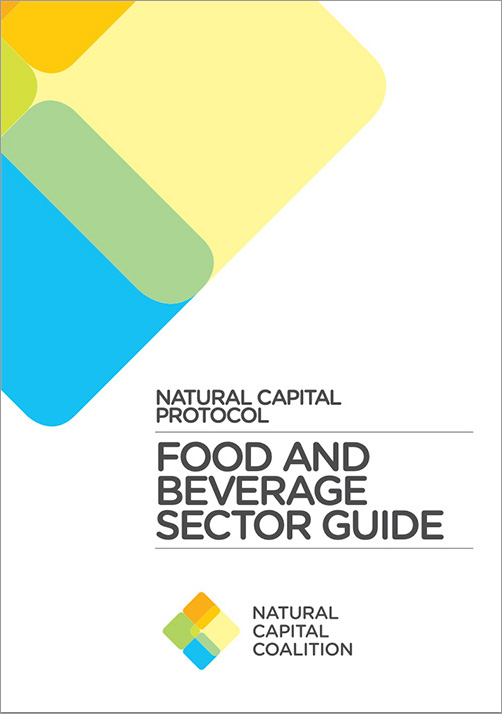
Natural Capital Protocol Food and Beverage Sector Guide
Farmers, traders, wholesalers, food manufacturing companies, and retailers together make up the world’s largest sector, generating an approximate global value of around USD 12.5 trillion based on revenue, or 17% of world GDP in 2013. The Natural Capital Protocol provides a standardized framework to help food and beverage sector businesses identify, measure, and value their impacts and dependences on natural capital.
Download a pdf of the guide (1.7MB)
True Price
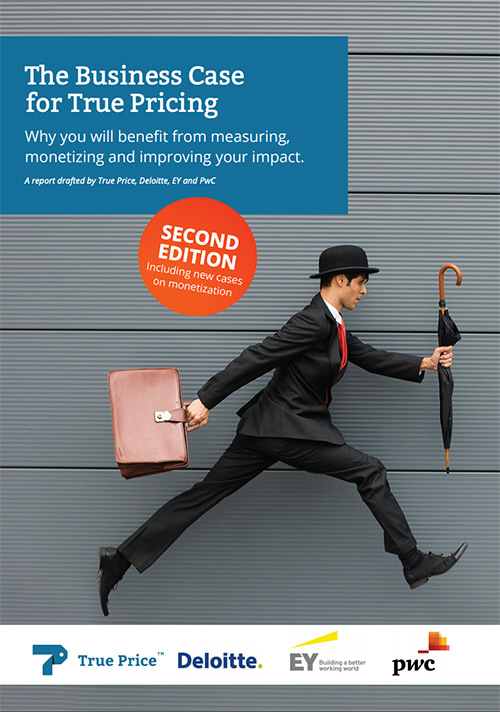
The Business Case for True Pricing Report
Deloitte, EY, PwC and True Price compiled a report on the opportunities which monetizing social and environmental impact presents. The report includes case studies from Solvay, Kering, Infosys, DSM, BAM, Holcim, Hivos and Tony’s Chocolonely, illustrating how organizations use monetization to step up their management of externalities (an organisation’s costs or benefits to society). The report will help companies understand what monetizing is all about and how it can support the business case for sustainability.
Download a pdf of the report (4.6 MB)
Natural Capital Finance Alliance
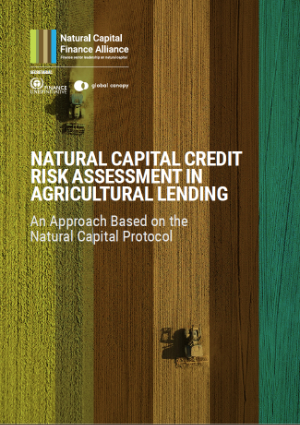
Natural Capital Credit Risk Assessment in Agricultural Lending
The report enables financial institutions to conduct natural capital credit risk assessment across different agricultural sectors and geographies, taking into account factors such as water availability, use and quality; soil health; biodiversity; energy use and greenhouse gas emissions.
The new sector-specific guide is consistent with the leading international standard for including natural capital in business decision-making, the Natural Capital Protocol and complements the Natural Capital Finance Alliance’s new ENCORE tool and step-by-step guide to incorporating natural capital into bank’s risk management processes.
The approach was developed in response to growing demand for better frameworks to assess natural capital risks in key sectors of the economy.
Download the PDF of the report (1.9MB)
Value Balancing Alliance
The Value Balancing Alliance e.V. is a non-profit organisation founded in 2019 and is supported by Deloitte, EY, KPMG, PwC, the OECD, leading universities and other stakeholders from government, civil society and standard-setting organisations. The alliance aims to create a standardised model for measuring and disclosing the environmental, human, social and financial value companies provide to society.
The Conference Board
Founded in 1916, The Conference Board (TCB) is the member-driven think tank that delivers insights to help its Members anticipate what’s ahead, improve their performance, and better serve society. TCB has produced two reports on impact valuation as an emerging mainstream method for impact reporting.
Get in touch
FoodSIVI welcomes the creation of new partnerships. If you’re interested in collaborating, get in touch

